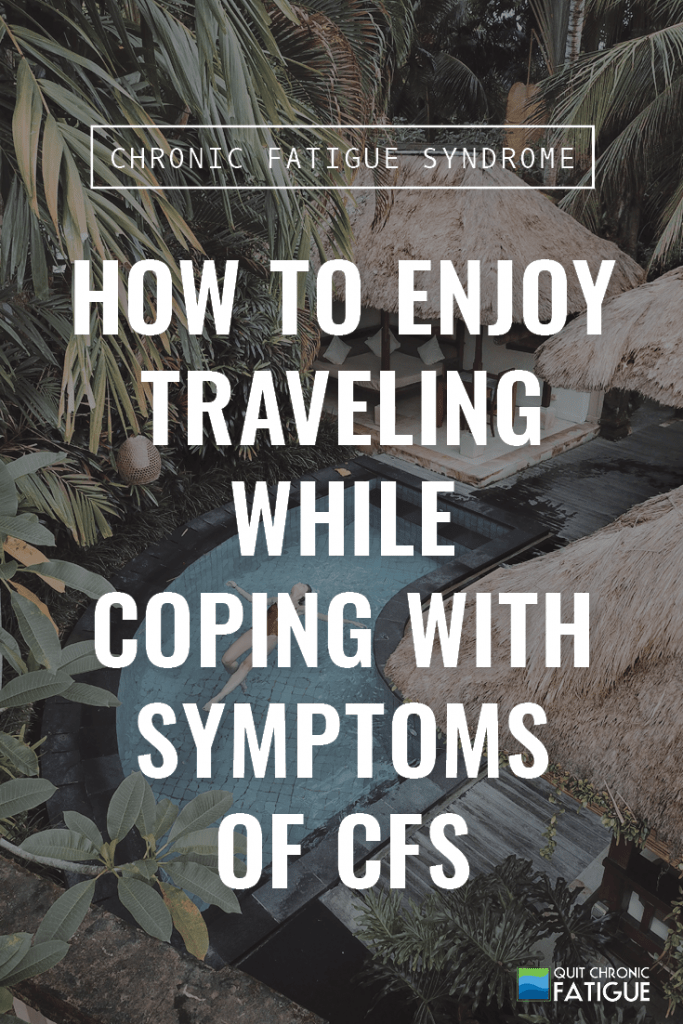Living with chronic fatigue syndrome (CFS) can make even the simplest tasks more difficult. You’re exhausted all the time. Your body hurts. Your brain is foggy. It can make things like traveling feel impossible.
However, there are many things you can do both before and during your trip to make traveling with the symptoms of CFS a little easier. If you love to travel and see new places, you shouldn’t let CFS stop you. With a little caution and planning, traveling can still be an enjoyable and rewarding experience.

What is Chronic Fatigue Syndrome?
Chronic fatigue syndrome (CFS) is a disorder in which you suffer from extreme levels of fatigue that last for at least six months and cannot be explained by any other underlying conditions. It’s also known as myalgic encephalomyelitis (ME) and sometimes referred to as ME/CFS.
CFS can be difficult to manage because any kind of physical or mental activity can make the fatigue worse and it doesn’t improve with rest. Treatments focus on addressing the symptoms, rather than curing the problem itself, as the exact cause of chronic fatigue syndrome is currently unknown.
There isn’t a medical test you can take to be diagnosed with CFS. Other diseases have similar symptoms, so typically you have to undergo a series of tests to rule those out first.
What are the Symptoms of CFS?
Everyone experiences CFS a little differently. The symptoms and severity can vary depending on the person and even the day. Here are some common symptoms of chronic fatigue syndrome:
- Fatigue
- Difficulty concentrating
- Memory problems
- Sore throat
- Headaches
- Swollen lymph nodes in the neck or armpits
- Unexplained joint or muscle pain
- Restless sleep
- Dizziness when changing positions
- Extreme exhaustion after mental or physical activities
Related: 5 Strategies for Living with Chronic Fatigue Every Day
Tips for Traveling with Chronic Fatigue Syndrome
Plan Ahead
The more planning you do ahead, at your own pace, the less energy you’ll need to expend when you’re actually traveling. This is a critical step for enjoying your trip and managing your symptoms. Choose the routes that will be easiest for you and consider hiring a driver for your journey so you don’t have to worry about navigating public transportation. Research ahead of time what restaurants and attractions you want to visit and their level of accessibility. Rent an apartment instead of a hotel room so you have more privacy and a kitchen for days you aren’t able to get to a restaurant. If you’re traveling to a foreign country, learn any key phrases you may need, and have a translation app ready to go on your phone.
Manage your Expectations
You know your body best. Take care of it. It can be easy to get caught up in the excitement of a new place, but it’s essential to be realistic about what you can physically do. Plan your days so that you have plenty of time to rest and do things at your own pace, rather than trying to cram so many experiences in that you get exhausted and have to spend a full day in your hotel room. Figure out what you really want to see and experience and prioritize those places and activities and maybe pass on some of the other options that don’t excite you as much.
Ask for Help
Pushing your body past its limits instead of asking for help is a mistake many people make and it can really put a damper on your trip if it means you’re too fatigued to do everything you planned. Don’t be afraid to ask for a wheelchair if you’re unable to walk or to take a break from what you’re doing when you need to rest. You’ll find people are generally happy to help and want to see you healthy enough to enjoy your trip.
Schedule Time for Resting
If you’re traveling for an event, whether its a wedding, holiday, or conference, you’re likely to do a lot of socializing. Actively schedule a time to rest in a quiet place away from other people. Even if you’d rather stay and talk, if you push yourself you may end up lowering the quality of the conversations you’re having because you’re feeling fuzzy and unable to be fully present. You might not even remember who you talked to. Taking a break allows you to return to your friends, family or colleagues refreshed and ready to engage meaningfully.
Keep Your Routine
Just because you’re traveling, doesn’t mean you have to throw away the routine and habits that help keep you healthy. Do what you can to bring your routine along with you. Pack any medicines and vitamins that you need. Try to get up and go to bed at the same time you usually do. If you have little tricks for making life easier at home, do them while abroad, whether that means bringing extra-warm clothes because you know you get cold or making and bringing healthy snacks along with you on day trips. Your health comes first and if you manage your symptoms, your whole trip will be more enjoyable.
While the symptoms of CFS can make traveling more difficult, they don’t have to make it impossible. By taking steps, both ahead of time and during your trip, you can manage your symptoms, prioritize your health, and have a great time seeing more of the world.





